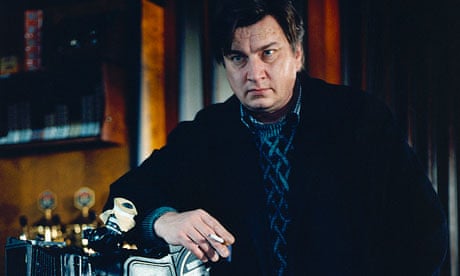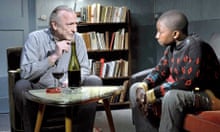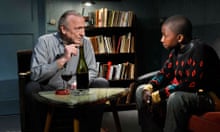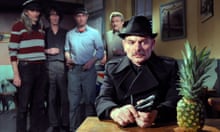Aki Kaurismäki sits in his heavy black coat, grimacing. The miserabilist's miserabilist is looking more miserable than it is possible to imagine. I have been told it is best to interview him first thing in the morning, because he starts to drink after that. It is now four in the afternoon, and he seems to have been glugging back the white wine for a good few hours.
He is waiting for a member of staff at Soho House in London to tell him to put out his fag, and he is not disappointed. "I'm sorry, sir, we have told you, you can't smoke in here." Kaurismäki looks surprised, as if this is the first he's heard of it, apologises and throws his lit cigarette into a glass of water. The waitress picks up the glass to take it away. Kaurismäki shouts, as if he's just been mugged. "That's my water! That's my water!" She runs away. Finland's greatest film-maker smiles.
Kaurismäki, now 55, is one of my favourite directors. For 30-odd years, he has been making the bleakest comedies – films that reflect his own soul, and that of his mother country, perfectly. They are dark and joyless, starring men who look like walruses and women who look like rats. His characters work away at dull jobs in factories or down coal mines or washing dishes, and rarely talk to each other. (In 1990's The Match Factory Girl, there are 13 minutes before the first line of dialogue, and the whole film is only 68 minutes long.) They usually drink too much and the more decisive ones kill themselves: in Ariel, a father and son sit in a bar; then the father gets up, goes to the loo and shoots himself. The best his protagonists can hope for is escape, usually by boat.
But, amazingly, these films are funny and romantic. In fact, the bleaker Kaurismäki the man has become, the more tender his films. It's simple, he says: "When all the hope is gone, there is no reason for pessimism." The Man Without a Past, which won the Grand Prix at Cannes in 2002, is typical of his latter-day ability to find hope in the hopeless: an unnamed man is mugged, left unconscious, loses his memory and is left to rebuild his life, befriended by dossers and drifters.
Kaurismäki lights another fag. His new film, Le Havre (set in France, though as Finnish as ever) is his first in six years, and his most weirdly optimistic. In fact, he might well have created a new movie genre: the asylum fairytale. It begins with the police stopping a lorryload of asylum seekers; a young boy runs away, takes refuge in the shallows of the freezing sea, and is discovered by an elderly shoeshine who takes him home. Yes, the characters still drink in silent misery, but Le Havre is also an astonishing affirmation of the power of love.
What inspired the film? "I read more and more articles, watched more and more TV news about people who have been drowned in the Mediterranean, when they've been promised the golden land of Europe. They come full of hopes, and it started to disturb my mind a lot. So what can I do? It's a film. I might look like a cool guy, but I am most sentimental. I care about others, not too much about myself."
There is a wonderful exchange in the film when the shoeshine asks his wife, ill with cancer, if he can visit her in hospital. She tells him to stay away until she is through the worst. "After two weeks come back and bring the yellow dress that I wore at La Rochelle," she says. I tell him it's my favourite line in the film. He smiles. "My favourite, too. I cried when I wrote that." Why La Rochelle? "Because I had a nice moment with my wife there."
Kaurismäki continues to smoke in the near dark, waiting for the inevitable tap on the shoulder while telling me about his solution to life's iniquities. This is a philosophy which might have been co-authored by Samuel Beckett and Osama bin Laden. "For mankind, I can't see any way out," he says in his deadly monotone, "except terrorism. We kill the 1%." Which 1%? "The only way for mankind to get out of this misery is to kill the 1% who own everything. The 1% who have put us in the position where humanity has no value. The rich. And the politicians who are the puppies of the rich."
Has he ever thought of going into politics? "No, never. Politics are corrupt." You wonder if he would say any different when sober; I suspect, if anything, he would be more extreme. Of course, it could all be a pose but I don't think so. His own life has been even bleaker than his films. He tells me about the men in his close family who have killed themselves, and asks me not to name them. That was their personal choice, he says, and it is not something he wants to intrude on.
The manager of Soho House walks into the room. "I'm sorry, sir, but this really is the last time. We have told you twice you can't smoke in here." Kaurismäki looks at him with doe-eyed innocence, and apologises again, while we are moved to the verandah. By now we are both knocking back the wine, the only difference being that Kaurismäki tends to empty the glass in one gulp. Is it true that he can only direct when drinking? No, he says, that's rubbish; he can't write or edit when drinking, but it makes no difference when directing, so he does drink. But he doesn't have to.
What would he say defines the Finnish character? "Melancholy," he says instantly. Why does Finland have such a high suicide rate? "Lack of light. Light in every way. The sunshine. Now it is proven medically that people need vitamin D. It is always dark, and when it is dark, it is also dark in the mind." Does this worry him? He glugs back another glass. "I more or less know I will kill myself, but not yet." What would make him do it? "Misery." I am beginning to feel protective of him. You are too much of a romantic, I protest. "Yeah, yeah. So I don't shoot myself in my head, I shoot myself in my heart."
Still, there might be hope for him. He and his wife now spend half the year in Portugal. Did they move there for the light? "It is the furthest place from Finland in Europe." We talk about family, and he mentions his wife, an artist who doesn't like exhibiting her work. After 26 years of marriage, he is obviously still besotted. Is she as miserable as him? He smiles. It's a lovely, sweet smile; you have to earn it, but it's worth the wait. "No, she loves life. Otherwise I wouldn't be here." I bet you are the most attentive, romantic husband there is, I say; I bet you buy her flowers and that she's got that yellow dress still. "Yes, she does. In my last three films the female characters are all my wife." Does she like that? "She didn't even notice." Do they have children? "Too many." How many? "None."
He lights another cigarette, and tells me he has only just started smoking again. How many a day? "Three boxes, 60. My record is 12 boxes. When I have to deal with idiotic questions like yours I have to smoke more." That's a bit rude. He grins like a little boy who knows he's gone too far. "Well, I wanted a reaction. I didn't mean to be rude, I just wanted to provoke you."
Kaurismäki has never been a great respecter of convention or the law. As a young hippy he drifted from job to job. For a while, he was homeless; he often spent the night in police cells after being arrested for bad behaviour. You sense he's still not quite sure how he became a film-maker (as did his brother Mika; for a time they ran a production company together, but haven't spoken for 20 years. "For reasons you don't have to know. Never have economic relationships with your so-called friends").
He certainly loved movies as a child, and found solace in the silence of Keaton and Chaplin. Homages and allusions to past masters are woven into his films: Le Havre nods to Marcel Carné (the shoeshine is called Marcel, and his wife Arletty, after the star of Carné's Les Enfants du Paradis); there are also nods to Jean-Pierre Melville and Robert Bresson.
His love of film is equalled only by his despair at contemporary cinema – not least his own. He insists no director has made a masterpiece since the 1970s. What about Scorsese? He snorts, and glugs. "Goodfellas is bullshit. It is the lousiest film ever, ever made. After Raging Bull, he was a lousy amateur." Terrence Malick? "The first one [Badlands] was OK. That was in the 1970s. After that they were Christian bullshit."
There is just time to top up with a beer. I ask Kaurismäki why he has not made a film in six years. Because his films are dreadful, he says; he is getting old and slowing down, and he has already given too much of his life to cinema. What has he been doing with his time? "I prefer to wander around mushroom areas in the forest." Eating them? "Of course. Finland has the best." He gives me a handy hint on hallucinogenics. "Cook them before you put them in the tea. I don't give recipes, but I only eat the ones I pick."
Kaurismäki sparks up one last time, and we toast the good things in life: drink, mushrooms, death, his wife, love. I ask him what he thinks of his most recent film. "This one?" He looks shocked at the question, and asks again. "My own?" He pauses. "It may be the first one I don't hate."
That's brilliant, I say. "Give me five. On the side. Up above."
"Down below. You're too slow," he says.
And he actually laughs. "I don't like the film, but I don't hate it either. For me, that's progress."





Comments (…)
Sign in or create your Guardian account to join the discussion